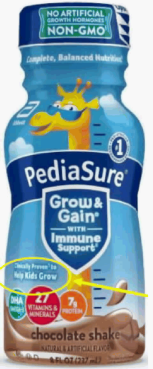Noriega v. Abbott Laboratories, --- F.Supp.3d ----, 2024 WL 402925, No. 23 Civ. 4014 (PAE) (S.D.N.Y. Feb. 2, 2024)
Noriega alleged that Abbott’s PediaSure falsely advertised
that it was “[c]linically proven to help kids grow.” The packaging claim also
contains an asterisk directing a consumer to a statement on the labeling that
reads, in smaller font: “Studied in children at risk of malnutrition.” The
label also includes a cartoon giraffe next to, and exceeding the height of, a
cartoon ruler.
 |
| example package with "clinically proven" claim circled |
On its website, Abbott lists six clinical studies as “references” supporting the statement in its packaging that the Grow and Gain drink is “clinically proven to help kids grow.” The complaint cited three additional studies that, although financed by Abbott and undertaken by Abbott-affiliated researchers, weren’t listed, which allegedly did not find evidence that PediaSure led to an increase in children’s height-to-age or height-to-weight.
Noriega’s own grandson was short for his age; she allegedly
paid a premium for it, but after around a year, she stopped, because her
grandson, despite ingesting two Grow and Gain Drinks per day, remained short
for his age, and had become overweight.
At the motion to dismiss stage, it was plausible that the “clinically
proven” claim was false or misleading under NYGBL §§ 349 and 350.
Abbott’s central argument was that the clinical studies
cited on its website support that PediaSure has been clinically proven to help
kids grow, and therefore it was implausible to term that claim materially
misleading. But the complaint alleged “strong, evidence-backed reasons to doubt
Abbott’s claim including clinical studies that Noriega suggests may be as or
more sound than those Abbott cites.” The complaint made methodological critiques
of Abbott’s favored studies, which weren’t implausible. Some of them derived from
a published, peer-reviewed paper. And although “identifying flaws in a
scientific study does not necessarily make marketing statements based on such a
study false or misleading,” “at the motion-to-dismiss phase, it is not the
Court’s province to look beneath a facially colorable methodological critique
where doing so would require resolving factual disputes and/or making
scientific assessments.”
In footnotes, the court said it wasn’t relying on the critique
that it was “methodologically improper” to base the “clinically proven” claim on
children suffering from malnutrition in foreign countries. Noriega alleged that
the nutritional experiences of such children materially differ from those of
children in New York State and that “American children ... are not ‘at risk of
malnutrition.’ ” “Although Noriega is at liberty to pursue such a theory in
this litigation, the Court, in finding the Complaint’s § 349 and § 350 claims
plausibly pled, puts aside these dubiously sweeping generalizations about the
nutritional experiences of American children.” Relatedly, whether the
asterisked disclaimer sufficed to clarify the claim was not suitable for a motion
to dismiss.
Although “every clinical study could be criticized in some
way,” the complaint here went “well beyond” “nitpicking” to “substantial.”
In addition, the complaint cited published literature disputing
the methodologies of several of the studies on which the Abbott label’s
effectiveness claim relied. And it cited three allegedly contrary Abbott-funded
studies. “[T]he existence of studies contradicting the label’s claim reinforce[s]
the plausibility of the Complaint’s allegation that the label would mislead a
reasonable consumer.” Discovery was the place to evaluate the merits.
Cases like this serve as implicit rebukes to the Fourth Circuit's unserious GNC decision.






No comments:
Post a Comment